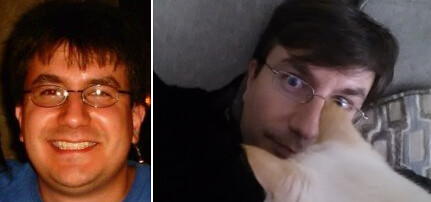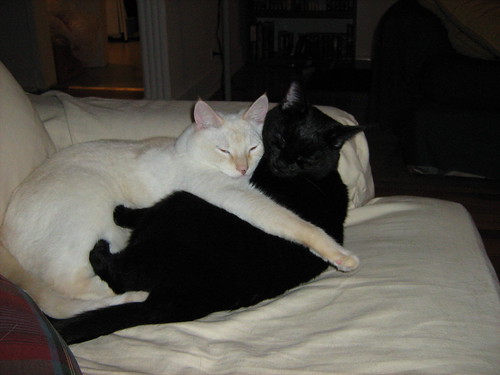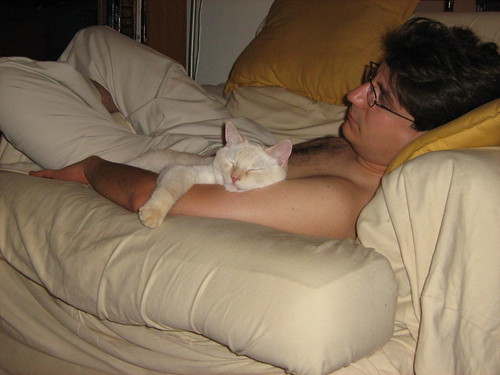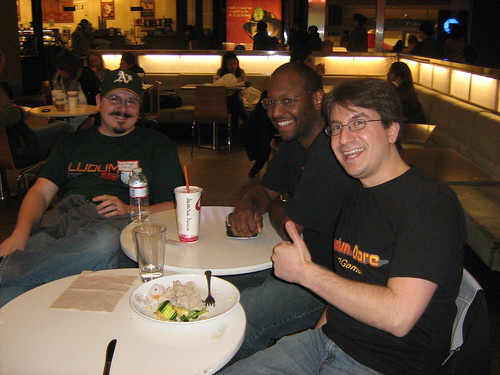There’s been a meme going around in which indie game developers have posted photos of themselves today juxtaposed with photos of themselves from 10 years ago.
It took me forever to find a 2006 picture of myself.
Let’s go back in time.
10 years ago, states were passing laws to ban the sale of video games to minors. It was after Bush was elected and everyone was falling all over themselves to prove they had “family values”, so a lot of governors were posing with moms and demonizing the great scourge of video games. In the end, each state had its law struck down as unconstitutional (which is to be expected when you base your law on versions from the other states that had been declared unconstitutional already), and it cost the states a lot of money.
I ended up voting 3rd party that year.
Roger Ebert was claiming that games could never be art. Again. And some high profile people in the game industry were arguing the same. I gave my thoughts back then in What Are Games Good For?.
Games were projected to double in revenue by 2011 driven by online and mobile gaming. Keep in mind that the iPhone wasn’t introduced until the next year, and so everyone was thinking mobile meant Java and Brew or Palm Pilots.
Digital Rights Management was in the news, whether it was about computer hardware, games, or things like the Broadcast Flag. I made my opinion known about how annoyed I was that people were so cavalier about it.
Nintendo’s Wii was released, and there was a day when everyone was talking about how ridiculous the name was. Then almost immediately everyone was used to it. I wouldn’t get one until 2009.
Steve Pavlina’s Dexterity.com shut down that year as he completed his transition from the game industry to the personal development industry. His game developer forums eventually became the IndieGamer forums, and his old game development articles turned up either on his site or elsewhere.
People were already comparing game development and photography. The indiepocalypse was quaint then.
The World Cup was in Europe, and the United States had one of their most epic matches against Italy, with both sides losing players before the final whistle. The US was defeated by Ghana to be eliminated in the group stages. Super disappointing. It took two more tries before they would beat them.
What was I up to?
In 2006, there were a lot of firsts for me. It was the one year anniversary of my blog.
I set New Year’s resolutions, and while I didn’t accomplish all of them, the major one was the formation of GBGames, LLC.
Back then, I was living with a girlfriend in an apartment in Chicago. I was working as a paid intern at the Chicago Mercantile Exchange in the UNIX group, and shortly after I formed my company, I got a software development job at WMS. It was across the street from Midway Games, and I worked on slot machines.
My cats, Diego and Gizmo, entered my life that summer. Before them, I never even had so much as a goldfish as a pet, unless you count the rooster my father brought home one time which I later realized was the dinner my mother prepared the next day.
During crunch time, I would get home feeling dead, and the next thing I knew I would have both cats curled up on me as I lay on the couch. I hated crunch time, but I loved those moments with my cats.
As someone interested in becoming a better indie game developer, I joined the Thousander Club. Back then, everyone was recently introduced to the idea that it takes 10,000 hours of practice to become an expert at something. Seriously, everyone who was blogging was blogging about it. If you work on your craft for a few hours a day, over the course of a year you would do about 1,000 hours, well on your way to becoming an expert in 10 years.
The Thousander Club was a way of tracking my hours and publicly holding myself accountable. Aside from the person who originally started it, I don’t remember too many people joining this club, but I would keep it up for a few years, although I never spent that much time in a given year on it. By the end of 2006, I had only 262.25 hours, only a little more than 25% of the goal.
I was working on a game I codenamed Oracle’s Eye, and I can’t remember what the game was about at this point. I remember a ball that could be bounced around the level by the player.

 It was a stick figure in 2005. I actually like the look of the tiles. Eventually I created a business man sprite.
It was a stick figure in 2005. I actually like the look of the tiles. Eventually I created a business man sprite.Since I was writing the game from scratch using libSDL, I encountered and had to solve issues most kids these days get for free with their Unity3Ds and their GameMakers. I had to solve my own hit detection issues, such as the ball or the player entering and getting stuck in walls. I spent time learning the wrong and better ways to write code to make objects move around. Thanks to those early efforts, today I recognize certain issues before they become issues. That’s experience.
But I was bad at finishing my projects then. I had plans to submit a game to the Independent Games Festival that year, but I eventually started over with Oracle’s Eye Prime, which I also don’t have much of a recollection of. It was one of those “I’ve learned so much! This time I’ll do it better!” kinds of restarts. I never finished it, and I never ended up getting a game submitted to the festival. I was super frustrated with myself about that failure.
I switched to creating a Pong clone (I should write another one just to see how much faster I could do it today), and later a Space Invaders clone.

Note the orange “ship” which was originally blue.
I learned about accommodating color blind players when a tester asked me why my spaceship and background were the same color when they most definitely were not, and it has been something I’ve tried to be aware of ever since. See Game Design for the Color Blind Player and Making Your Game Accessible to People Who Are Color Blind.
I was just starting to learn about Agile software development and wondering how to apply it to my own efforts to make me more effective.
I joined the Association of Software Professionals the year prior and wanted to become more involved so I could get more out of my membership. A lot of indies joined back then, and many of them let their memberships lapse, which was too bad. I attended the Grand Rapids Schmooze and met a bunch of great people I’m still friends with. Eventually I became a board member and then president of the organization, something I didn’t really anticipate back then.
The next year’s resolutions included the goal of selling my first game, but I woefully underestimated how much I still had to learn about making games, let alone selling them.
And today?
Since then, I had saved up a chunk of money, quit my job, moved from Chicago to Des Moines, Iowa, all to go full-time indie and live the dream. I got quite a bit of feedback from people in the industry which I promptly ignored, then ran out of money and got a day job again after about two years. So, GBGames is back to a part-time effort for me.
So four years as an employee at a company making slot machines, two years being a full-time independent game developer, and now another four years as an employee, only now I don’t work on slot machines and the devices are quieter.
I went to GDC in 2011, so I could check that off my list. I met a lot of people I’ve only ever known through the Internet, including a bunch of people from Ludum Dare or the IndieGamer forums.
These days when I learn that someone’s kid is really into Minecraft, I find that half the time they get super impressed when I say, “You know, I met Notch once.” The other half of the time they say, “Who?” That meeting, by the way? We talked about our Ludum Dare projects before he had to go handle some email emergency.
Shortly after GDC, I proposed to my girlfriend on the balcony of a castle in Europe. We got married. I still have two cats. I’m a home-owner now.
My four years working on slot machines taught me a lot about working on big projects, but my experience working on Stop That Hero!, writing and designing everything from scratch, turned me into a pretty good software developer. I leverage the knowledge and expertise I gained from game development at my current day job, which pays me well.

So, in general, I’m doing great. I’m fairly healthy. I’m getting paid very well to apply my skills and training daily. I’m fortunate to be married to a wonderful and incredible woman. I am living in a comfortable and spacious home. And again, I have cats.
And yet…
But my business isn’t doing well at all.
Part-time efforts means that things run slowly. What I thought would take me a matter of weeks ends up taking many months. And being slow in this industry is death when there are dozens of games being released daily. I learned about the importance of speed at GDC in 2011, so I knew this fact even before the market got flooded.
I once went to a talk by an entrepreneur who said working part-time on a business just isn’t sustainable because by the time you put something out there, others with more resources and time on their hands might have gotten there first. He said there’s a reason why many entrepreneurs end up divorced.
Well, that sucks. My priorities put being a good husband above my business, and I know other people make different choices in this regard, but I love my wife and can’t see ever deciding that my Limited Liability Company is more important than our partnership.
When I was single and younger, I could work a full-time job, then work for hours on my game development without too many worries. I was just undisciplined and unfocused then, so I didn’t take advantage of it as much as I should have.
Today, I’m better disciplined and more able to focus, but now my time is split quite a bit. I’ve learned that I can’t work on my business too much before I start getting rubberbanded back towards other responsibilities or my health starts forcing me to pull back.
The year prior to 2006, I assessed my ability to create at a very low value and identified it as my major weakness. It’s why I joined the Thousander Club, and I wish I put more time into it back then.
In 2006, I did 262.25 hours of game development. That’s about 1.4 hours a day, which isn’t much, but it can work. It didn’t really result in much that year, though.
This past year? I only did 259.5 hours of game development so far, although that number doesn’t include the 40+ hours of writing and 40+ hours of business planning and marketing I’ve put in. Yet, I had a plan, and I managed to publish. 10 years on, and I am still taking too long to work on a game, but at least I finish my games now.

Yes, it was meant to be finished in three months and took about 10, and even though I spent a lot more time on game design and balance as opposed to infrastructure and technical details, I still felt very frustrated with how slow this project went.
My wife pointed out that had I worked on it full-time, I easily could have done the almost 260 hours within three months.
Fair enough. I felt better. A little. It’s easy to get frustrated when you compare your struggles and efforts with the successes that other people publicize, or with the future possibilities. Saying things like “I’m a failure because I spent a year making a dinky game while this highly polished mobile game is making millions” is a good way to get yourself stressed. I went through that with my previous project.
You need to measure your progress looking back at where you came from. And compared to how I was in 2006, I’m way more capable as a game developer, as a software developer, as a partner in a relationship, as a business owner, and as a leader. I mean, I know terms like “the Dunning-Kruger effect” now.
10 years goes by quickly
But in 10 years, I’ve only published less than a handful of games commercially? Oof. I still haven’t submitted a game to the IGF. It’s not that I haven’t worked on games, but unless I take my Ludum Dare or One Game a Month projects and polish them up for release, they kind of don’t count except as ways I’ve gained experience with making games.
But again, when I think about what I have accomplished since 2006, it adds up to a few commercial attempts and over 20 different published projects that are more or less playable. Each Ludum Dare game jam or experiment adds to my expertise. Each finished project makes the next one that much easier.
So, I’ve grown quite a bit. And I did it my own way. And doing it my own way was part of the appeal of going indie in the first place.
I don’t know too much about what my life will be like in another 10 years. My wife and I will be middle-aged then. My cats are getting old and may not be there with us, which makes me sad when I think about it. I’m getting old, and I worry that I’ll fall behind in terms of my technical expertise with artificial intelligence and automation threatening once-secure jobs. I worry about continuing to miss out on opportunities. I feel out of touch with the game industry as it is. I worry about becoming a sad old man who refuses to acknowledge the futility of what he’s doing.
Frankly, I don’t have an exit plan. I don’t have an idea of a situation or point in time when I say, “Well, that’s it. I’ve hit the limit of what I will accomplish in game development for my lifetime.”
Ever since I went back on “corporate welfare”, I’ve been working slowly and trying to build up my business, with the expectation that it will all come together. I don’t mean getting lucky with a hit game, but that the business will eventually become sustainable as my full-time employment.
I have been aiming to build up streams of income, rather than hope for a big jackpot. But for a few years now I’ve been worried that the premise isn’t workable, that it’s not possible to do what I’m doing and expect great things eventually. I’d hate to think I’m limiting myself to mediocrity.
But I chose my current approach because there are certain things in my life that I value as more important. I’m trying to be the tortoise and shouldn’t get frustrated when the hares around me are sprinting by, often off cliffs.
Many of the game developers and blogs I followed back in 2006 are no longer around. Some retired. Some switched industries. Some gave up.
I’m still here, though.
And I expect to be here for another 10 years. In order to have more to show for it by then, I’m making plans to do more rapid and focused learning and hard work now to get me there. Part of that is rereading some of the advice people gave me in the last 10 years and reconsidering what I’ve ignored or misunderstood then.
Wish me luck!




